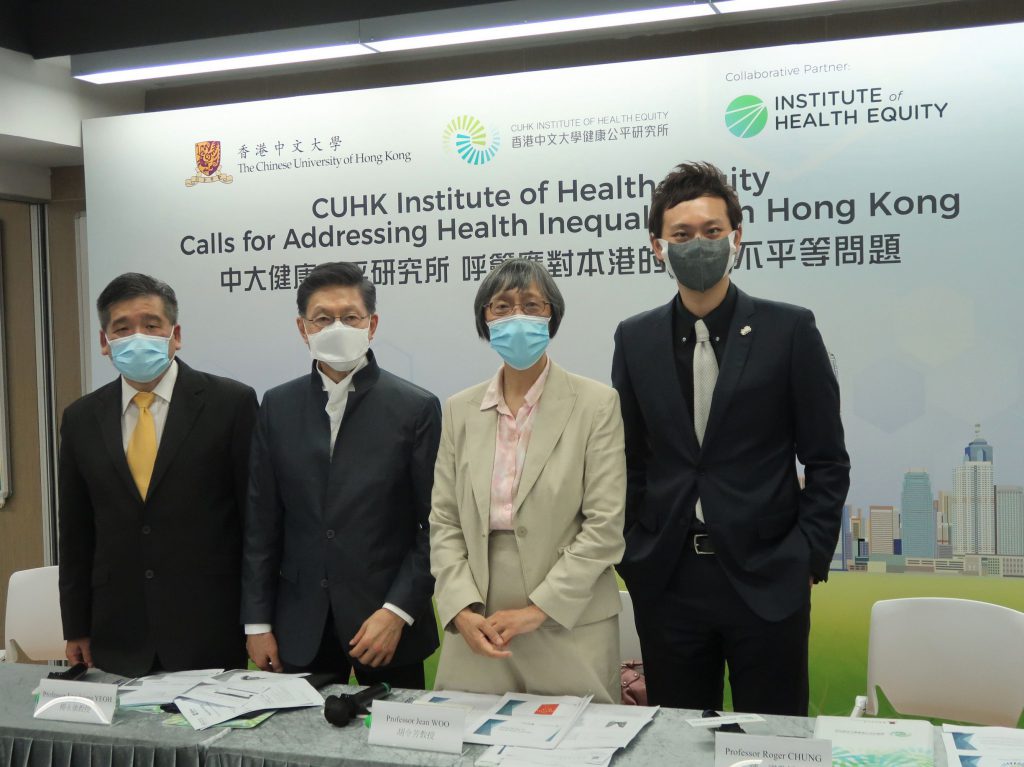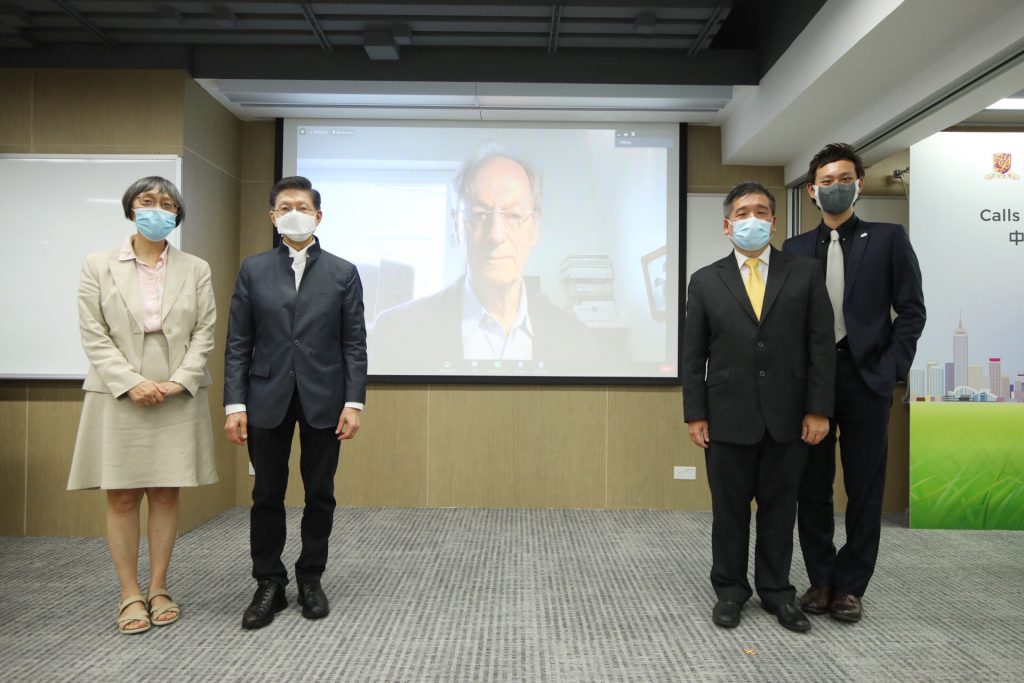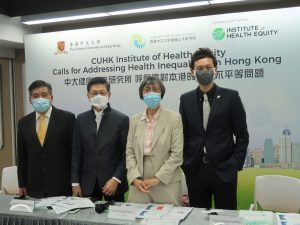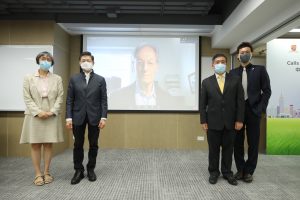CUHK
News Centre
CUHK Institute of Health Equity Calls for Addressing Health Inequalities in Hong Kong
The Institute of Health Equity of The Chinese University of Hong Kong (CUHK) collaborated with the University College London Institute of Health Equity to examine the health equity situation in Hong Kong. Initial findings point to a need to address health inequity issues and reduce socio-economic inequalities in health in Hong Kong.
Why Health Equity Matters
Since its establishment in 2020, CUHK Institute of Health Equity has been reviewing the health equity in Hong Kong to understand health inequalities and the underlying driving force. Health inequities refer to inequalities in health across the population and between different groups within society that are avoidable by reasonable means and are therefore unfair. The health outcomes of the population are influenced by “social determinants of health”, which refers to the social conditions in which people are born, grow, work, live, and age, and wider sets of forces and systems shaping these conditions of daily life.
Health inequality has significant financial and social costs to societies. A study estimated that in 2014 the overall cost of inequality to the UK is around £39 billion a year with other associated costs being incalculable. On the other hand, reduced inequality would increase healthy life expectancy by around 8.5 months and reduce the population in prisons by around 37 percent.
Health Equity in Hong Kong and Recommendations
The study gives an overview of the situation on health inequalities in Hong Kong, followed by in-depth analysis of some factors affecting health inequality and recommendations to improve them in the subsequent reports to be produced by the Institute. The results of the study revealed that while Hong Kong has the longest life expectancy worldwide, there are marked health inequalities and a “gradient” of health among groups of different socio-economic status, ethnicity, gender and educational attainment. In particular,
- there are profound social and economic inequalities in a range of health outcomes including subjective health status, overweight or obesity, chronic diseases, and mental health disorders. For example, the latest population-wide survey available showed that the proportion of people who rated their health as “poor” or “fair” gradually decreased from 50.9% in the lowest household income group (<$5,000 per month) to 23.1% in the highest income group (≥ $50,000 per month).
- the COVID-19 outbreak has exposed pre-existing social and economic inequalities in health and their impact on disadvantaged groups. As revealed in a survey by the Institute in 2020, 65.7% of people in the socially deprived group became more worried about their financial situation since the outbreak, compared with 30.6% of people in the non-deprived group. People of lower educational attainment also experienced greater adverse impact on their mental health. Moreover, prolonged school closure exerted a particularly stronger impact on children from low-income families and those with special needs, which in turn affected their cognitive and psychosocial development.
- a wide array of social determinants of health such as education, work, income, housing, social spending, and poverty are all closely related to the distribution of health outcomes.
Based on the findings and observations in the study, the Institute has made recommendations to improve the health equity of Hong Kong. The first and foremost recommendation is to raise public awareness of the importance of health inequalities, social gradients of health and social determinants of health in the community of Hong Kong. The engagement should go beyond the government to include non-government sectors such as academic institutions, non-government organizations, charitable foundations and the business sector. Other recommendations include:-
- setting up new databases that provide necessary linkages between socioeconomic indicators and health outcomes and improve the existing collection of data to identify, monitor and understand the upstream factors of health inequalities in Hong Kong regularly.
- reviewing the impact of COVID-19 and the containment measures on the physical and mental health of different social groups, and to incorporate analysis of the impact of policies on the health equality of society in future policies and measures to tackle the pandemic.
- better integrating efforts to mitigate social determinants of health inequalities in different policy areas with various sectors through engaging and building up consensus with stakeholders in different sectors including Government and civil society.
A brief note on the findings and recommendations is available at CUHK IHE.
Inaugural Symposium “Health Equity in Hong Kong and Beyond”
The study and press conference is part of the Institute’s on-going effort to kickstart and raise public awareness of the importance of health inequalities in Hong Kong. On 27 May 2021, an Inaugural Symposium entitled “Health Equity in Hong Kong and Beyond” will be held to highlight significant health equity studies globally and discuss lessons learnt from health equity studies in Hong Kong and its relevance to Asian economies. A joint symposium with CUHK Department of Social Work and CUHK Jockey Club Institute of Ageing will be held in parallel for Social Work students. A student seminar would be held on 28 May 2021 for graduate students to present their research projects and exchange ideas with health equity experts. Details of the progamme and registration can be found at the website of the Institute.
The Chinese University of Hong Kong Institute of Health Equity
The CUHK Institute of Health Equity was established in 2020 with the vision of being a leading institution in promoting health equity studies in the Asian region. It aims to promote research in health equity in Hong Kong and Asia, investigate if disparities exist in different communities and analyse them and the contributing societal factors. In collaboration with the University College London (UCL) Institute of Health Equity, the CUHK Institute of Health Equity will examine issues of health equity in Hong Kong so as to inform government policies and intervention programmes to improve the health equity of Hong Kong. Professor Sir Michael MARMOT from UCL, Professor E. K. YEOH and Professor Jean WOO from CUHK are Co-Directors of the Institute. Ongoing research projects aim to examine the health inequity situation in COVID-19 in Hong Kong, and factors contributing to the long life expectancy and health disparities in Hong Kong.
More details about the Institute of Health Equity can be found at www.ihe.cuhk.edu.hk.
CUHK Institute of Health Equity Calls for Addressing Health Inequalities in Hong Kong
The Institute of Health Equity of The Chinese University of Hong Kong (CUHK) collaborated with the University College London Institute of Health Equity to examine the health equity situation in Hong Kong. Initial findings point to a need to address health inequity issues and reduce socio-economic inequalities in health in Hong Kong.
Why Health Equity Matters
Since its establishment in 2020, CUHK Institute of Health Equity has been reviewing the health equity in Hong Kong to understand health inequalities and the underlying driving force. Health inequities refer to inequalities in health across the population and between different groups within society that are avoidable by reasonable means and are therefore unfair. The health outcomes of the population are influenced by “social determinants of health”, which refers to the social conditions in which people are born, grow, work, live, and age, and wider sets of forces and systems shaping these conditions of daily life.
Health inequality has significant financial and social costs to societies. A study estimated that in 2014 the overall cost of inequality to the UK is around £39 billion a year with other associated costs being incalculable. On the other hand, reduced inequality would increase healthy life expectancy by around 8.5 months and reduce the population in prisons by around 37 percent.
Health Equity in Hong Kong and Recommendations
The study gives an overview of the situation on health inequalities in Hong Kong, followed by in-depth analysis of some factors affecting health inequality and recommendations to improve them in the subsequent reports to be produced by the Institute. The results of the study revealed that while Hong Kong has the longest life expectancy worldwide, there are marked health inequalities and a “gradient” of health among groups of different socio-economic status, ethnicity, gender and educational attainment. In particular,
- there are profound social and economic inequalities in a range of health outcomes including subjective health status, overweight or obesity, chronic diseases, and mental health disorders. For example, the latest population-wide survey available showed that the proportion of people who rated their health as “poor” or “fair” gradually decreased from 50.9% in the lowest household income group (<$5,000 per month) to 23.1% in the highest income group (≥ $50,000 per month).
- the COVID-19 outbreak has exposed pre-existing social and economic inequalities in health and their impact on disadvantaged groups. As revealed in a survey by the Institute in 2020, 65.7% of people in the socially deprived group became more worried about their financial situation since the outbreak, compared with 30.6% of people in the non-deprived group. People of lower educational attainment also experienced greater adverse impact on their mental health. Moreover, prolonged school closure exerted a particularly stronger impact on children from low-income families and those with special needs, which in turn affected their cognitive and psychosocial development.
- a wide array of social determinants of health such as education, work, income, housing, social spending, and poverty are all closely related to the distribution of health outcomes.
Based on the findings and observations in the study, the Institute has made recommendations to improve the health equity of Hong Kong. The first and foremost recommendation is to raise public awareness of the importance of health inequalities, social gradients of health and social determinants of health in the community of Hong Kong. The engagement should go beyond the government to include non-government sectors such as academic institutions, non-government organizations, charitable foundations and the business sector. Other recommendations include:-
- setting up new databases that provide necessary linkages between socioeconomic indicators and health outcomes and improve the existing collection of data to identify, monitor and understand the upstream factors of health inequalities in Hong Kong regularly.
- reviewing the impact of COVID-19 and the containment measures on the physical and mental health of different social groups, and to incorporate analysis of the impact of policies on the health equality of society in future policies and measures to tackle the pandemic.
- better integrating efforts to mitigate social determinants of health inequalities in different policy areas with various sectors through engaging and building up consensus with stakeholders in different sectors including Government and civil society.
A brief note on the findings and recommendations is available at CUHK IHE.
Inaugural Symposium “Health Equity in Hong Kong and Beyond”
The study and press conference is part of the Institute’s on-going effort to kickstart and raise public awareness of the importance of health inequalities in Hong Kong. On 27 May 2021, an Inaugural Symposium entitled “Health Equity in Hong Kong and Beyond” will be held to highlight significant health equity studies globally and discuss lessons learnt from health equity studies in Hong Kong and its relevance to Asian economies. A joint symposium with CUHK Department of Social Work and CUHK Jockey Club Institute of Ageing will be held in parallel for Social Work students. A student seminar would be held on 28 May 2021 for graduate students to present their research projects and exchange ideas with health equity experts. Details of the progamme and registration can be found at the website of the Institute.
The Chinese University of Hong Kong Institute of Health Equity
The CUHK Institute of Health Equity was established in 2020 with the vision of being a leading institution in promoting health equity studies in the Asian region. It aims to promote research in health equity in Hong Kong and Asia, investigate if disparities exist in different communities and analyse them and the contributing societal factors. In collaboration with the University College London (UCL) Institute of Health Equity, the CUHK Institute of Health Equity will examine issues of health equity in Hong Kong so as to inform government policies and intervention programmes to improve the health equity of Hong Kong. Professor Sir Michael MARMOT from UCL, Professor E. K. YEOH and Professor Jean WOO from CUHK are Co-Directors of the Institute. Ongoing research projects aim to examine the health inequity situation in COVID-19 in Hong Kong, and factors contributing to the long life expectancy and health disparities in Hong Kong.
More details about the Institute of Health Equity can be found at www.ihe.cuhk.edu.hk.





